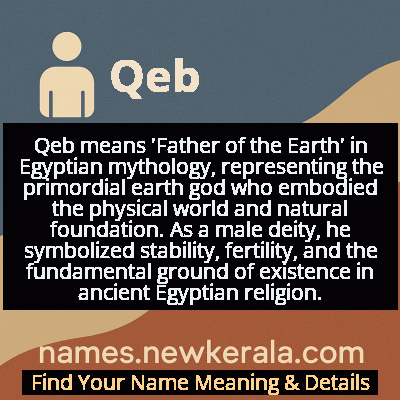Qeb Name Meaning & Details
Origin, Popularity, Numerology Analysis & Name Meaning of Qeb
Discover the origin, meaning, and cultural significance of the name QEB. Delve into its historical roots and explore the lasting impact it has had on communities and traditions.
Name
Qeb
Gender
Male
Origin
Egyptian
Lucky Number
6
Meaning of the Name - Qeb
Qeb means 'Father of the Earth' in Egyptian mythology, representing the primordial earth god who embodied the physical world and natural foundation. As a male deity, he symbolized stability, fertility, and the fundamental ground of existence in ancient Egyptian religion.
Qeb - Complete Numerology Analysis
Your Numerology Number
Based on Pythagorean Numerology System
Ruling Planet
Venus
Positive Nature
Harmonious, responsible, caring, and artistic.
Negative Traits
Overly idealistic, superficial, possessive, or jealous.
Lucky Colours
Pink, turquoise.
Lucky Days
Friday.
Lucky Stones
Diamond, turquoise.
Harmony Numbers
2, 3, 9.
Best Suited Professions
Artists, musicians, teachers, healthcare workers.
What People Like About You
Warmth, nurturing nature, artistic flair.
Famous People Named Qeb
Qeb (Geb)
Egyptian deity
Primordial earth god who ruled before the first pharaohs and represented the physical earth
Geb (Qeb)
Mythological figure
Father of Osiris, Isis, Set, and Nephthys; known for his laughter causing earthquakes
Keb
Religious figure
Alternative spelling of Geb/Qeb, worshipped as the god of earthquakes and vegetation
Name Variations & International Equivalents
Click on blue names to explore their detailed meanings. Gray names with will be available soon.
Cultural & Historical Significance
As 'Father of the Earth,' Qeb was not only a creator god but also a ruler - according to myth, he governed Egypt before the first pharaohs, and later pharaohs were said to sit upon the 'Throne of Geb,' legitimizing their rule through this divine connection. His association with the earth extended to vegetation and natural phenomena, making him a god of fertility and natural cycles. In temple art and hieroglyphs, Qeb was often shown with green skin representing vegetation or with a goose on his head, as the goose was his sacred animal. His cultural significance extended beyond mythology into daily life, where he was invoked for agricultural success and protection from earthquakes.
Extended Personality Analysis
In Egyptian mythology, Qeb (Geb) was characterized as a benevolent, life-giving deity with a calm and stable disposition, reflecting the enduring nature of the earth itself. He was known for his infectious laughter, which was believed to cause earthquakes but also symbolized his joyful and generous nature. As the 'Father of the Earth,' he embodied paternal qualities - protective, nurturing, and foundational. His mythological role suggests personality traits of reliability, steadfastness, and deep connection to natural cycles.
Qeb was often portrayed as a mediator in divine disputes, particularly between his children, showing diplomatic and fair-minded characteristics. His enduring presence beneath the sky goddess Nut demonstrates patience and stability, while his role in the creation myth indicates creative power and generative energy. The earth god's personality combines the solid reliability of the ground with the dynamic energy of growth and transformation. Mythological accounts describe him as generous with the earth's bounty but also capable of judgment, as seen in his role in determining inheritance disputes among his divine offspring. This balance between nurturing provision and authoritative judgment reflects the complex personality attributed to this fundamental earth deity.
Modern Usage & Popularity
In contemporary times, Qeb remains extremely rare as a personal name, primarily used by enthusiasts of Egyptian mythology or those with specific cultural connections to ancient Egyptian heritage. The name sees occasional use in fantasy literature, video games, and among communities interested in pagan or alternative spiritual practices. While traditional Egyptian names like Isis, Osiris, and Horus have seen some modern adoption, Qeb (Geb) remains largely confined to academic and mythological contexts. There are no significant popularity trends for this name in birth records, as it maintains its status as a primarily historical and religious name rather than a common personal name in modern societies. The name occasionally appears in artistic works, esoteric communities, and academic discussions, but has not entered mainstream naming practices in any significant way.
Symbolic & Spiritual Meanings
Qeb symbolizes the fundamental concept of foundation and stability, representing the physical earth as both a literal and metaphorical ground of existence. As 'Father of the Earth,' he embodies paternal protection, natural abundance, and the cyclical nature of life and death. His symbolic meanings extend to concepts of sovereignty and legitimacy through the 'Throne of Geb' mythology, connecting earthly rule to divine right. The god represents the interface between the celestial and terrestrial realms, serving as the stable platform upon which human civilization is built. His laughter causing earthquakes symbolizes the dynamic, living nature of the earth itself - stable yet capable of dramatic transformation. Qeb's symbolism encompasses growth, fertility, endurance, and the fundamental connection between humanity and the natural world, making him a powerful representation of both physical reality and spiritual foundation.

